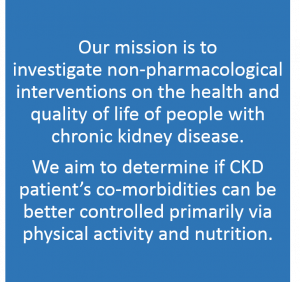 The Renal and Cardiovascular Disease Research Laboratory examines the efficacy of non-pharmacological interventions on the health and quality of life of people with chronic kidney disease (CKD). CKD patients often suffer from poor health and quality of life due to a high prevalence of co-morbid conditions, including cardiovascular disease, muscle wasting, bone disorders, and cognitive dysfunction. CKD patients are typically prescribed multiple medications to treat these problems, though the efficacy of many of these medications are unproven. Our lab aims to determine if increasing physical activity levels and improving nutrition enhance patients lives.
The Renal and Cardiovascular Disease Research Laboratory examines the efficacy of non-pharmacological interventions on the health and quality of life of people with chronic kidney disease (CKD). CKD patients often suffer from poor health and quality of life due to a high prevalence of co-morbid conditions, including cardiovascular disease, muscle wasting, bone disorders, and cognitive dysfunction. CKD patients are typically prescribed multiple medications to treat these problems, though the efficacy of many of these medications are unproven. Our lab aims to determine if increasing physical activity levels and improving nutrition enhance patients lives.
A principle focus in our lab is to develop sustainable interventions to reduce chronic volume overload, which is often described as the most vexing problem in CKD patients, especially for those who have kidney failure and are on dialysis. This complex problem results, in part, from dialysis patients producing little or no urine. Therefore, ingested fluid builds up in the patient until the next dialysis session. On average, patients gain between 2 to 4 kilos (~ 4 to 9 pounds) of fluid volume every 48 – 72 hours between treatments. This excess fluid causes a myriad of problems including elevated blood pressure, which leads to an enlarged, dysfunctional heart, and eventually congestive heart failure or related cardiovascular problems.
Some estimates suggest as many as 85% of dialysis patients in the U.S. may have chronic volume overload, and it is a primary reason for the excessive hospitalization and mortality rates in these patients. Removing this excess fluid during dialysis can then cause dangerous drops in blood pressure (intradialytic hypotension), which reduces blood flow to vital organs (myocardial stunning). It also causes cramping, cognitive impairment, and fatigue. These in turn, contribute to sleep disorders and low physical activity levels. This vicious cycle of excess fluid gain between treatments, and rapid removal during dialysis, is a primary factor contributing to the poor quality of life of these patients.
patients in the U.S. may have chronic volume overload, and it is a primary reason for the excessive hospitalization and mortality rates in these patients. Removing this excess fluid during dialysis can then cause dangerous drops in blood pressure (intradialytic hypotension), which reduces blood flow to vital organs (myocardial stunning). It also causes cramping, cognitive impairment, and fatigue. These in turn, contribute to sleep disorders and low physical activity levels. This vicious cycle of excess fluid gain between treatments, and rapid removal during dialysis, is a primary factor contributing to the poor quality of life of these patients.
Another intriguing problem our lab is investigating is the impact of sodium on skeletal muscle dysfunction. Emerging evidence indicates that sodium accumulates in skeletal muscle as we age, and even more so in CKD patients. This excess sodium may promote a variety of metabolic problems, including insulin resistance and mitochondrial dysfunction. Our lab is studying the mechanisms responsible for the adverse impact of muscle sodium, as well as determining if this sodium can be cleared through combinations of exercise and dietary sodium restriction.
These projects each support the overall goal in our laboratory of investigating the efficacy of novel approaches for improving the health and quality of life of patients with chronic kidney disease.
Current projects:
- Development and Testing of an Innovative Patient-Centered Physical Activity Program for Hemodialysis Patients (Move More)
- Assessment of Food and Cooking Skills in Hemodialysis Patients
- Dietary Sodium-Restriction and Renal Meals for Hemodialysis (DISaRM)
- Virtual Reality to Improve Emotional Well-being in Hemodialysis Patients

